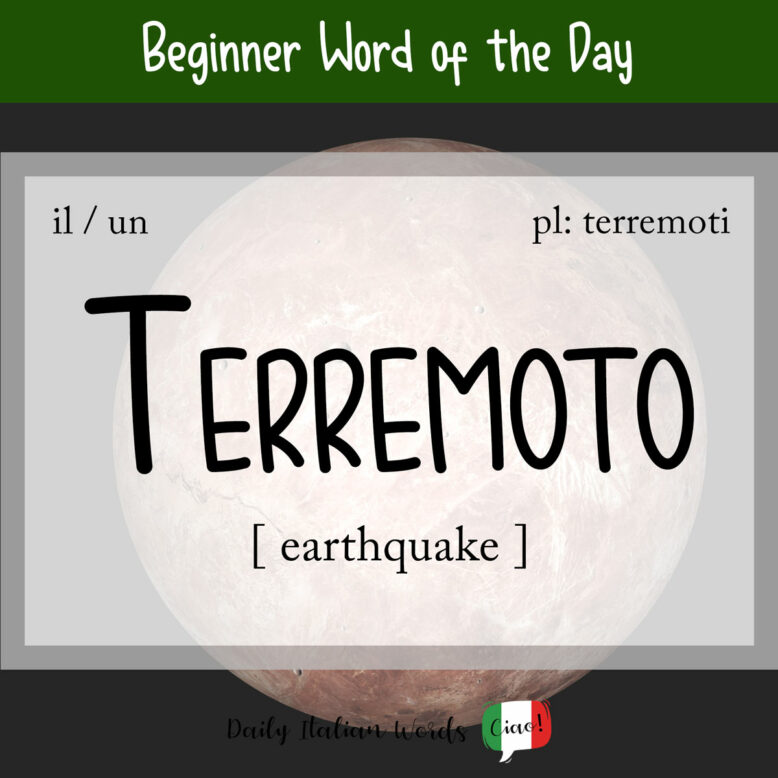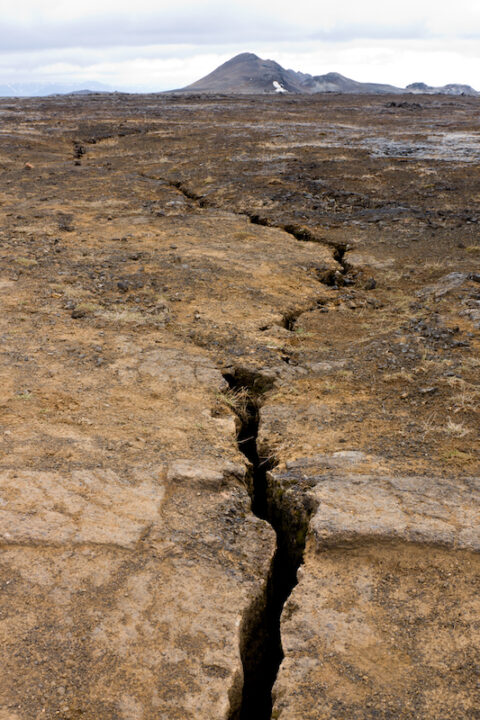The word for the terrifying natural phenomenon known as an earthquake is terremoto in Italian (masculine, plural: terremoti), which comes from the Latin terrae motus meaning ‘movement of the earth’.

It is a masculine noun that takes the following definite and indefinite articles:
- il terremoto = the earthquake
- i terremoti = the earthquakes
- un terremoto = an earthquake
- dei terremoti = some earthquakes
An earthquake occurs when pressure, building up within rocks of the earth‘s crust (crosta terrestre), is released in a sudden burst of energy. The tectonic plates (placche tettoniche) crack and slip past each other along a fault (faglia), causing the ground to vibrate (vibrare).
Some important terminology associated with earthquakes include:
- magnitudo = magnitude
- epicentro = epicentre
- scala Richter = Richter (magnitude) scale
- scala Mercalli = Mercalli (intensity) scale
- sismografo = seismograph
- scossa di assestamento = aftershock
Il terremoto ha causato uno tsunami con onde alte sei metri.
The earthquake caused a tsunami with waves that were six meters high.

Italy and earthquakes
Because of its unique location, where the African tectonic plate converges with the Eurasian tectonic plate, Italy is often prone to earthquakes.
The strongest ever terremoto is said to have occurred in 1693 in Sicily with a magnitude of 7.7. The city of Catania alone lost 16,000 souls out of its total number of 20,000 inhabitants at the time. Italy also holds the record for the most devastating earthquake in Europe: Messina 1908 with 100,000 deaths. Sicily is known as the terra ballerina (lit: dancing land).
Earthquakes are still frequent in Italy to this day. One of the biggest in the last 20 years is the one that occurred in L’Aquila (Abruzzo) in 2009. It claimed more than 300 lives, the city was almost completely destroyed and more than 80,000 people were evacuated.
An uncommon verb that derives from terremoto is terremotare which means to destroy or to devastate like an earthquake. From this verb we get the past participle terremotato/a which can mean either hit by an earthquake (when talking about a place) or earthquake victim (when talking about a person).
Figuratively speaking, terremoto can refer to a lively and restless person, usually a child or young adult, who habitually throws things into disarray. Similar terms in English would be terror or live wire.
La nipote di Giada è un vero terremoto. È impossibile tenerla sotto controllo!
Giada’s granddaughter is a real terror. It’s impossible to keep her under control!

Similarly, in the world of business, politics and economics, terremoto can denote a sudden, unexpected change that profoundly turns a situation on its head or upsets a balance.
Le sue dimissioni inaspettate hanno causato un terremoto all’interno del partito.
His unexpected resignation was like a shock inside the party.
This article is also available in video format on our YouTube channel. The audio version can be found on Podbean, Google Podcast, Apple Podcast and Spotify.
Heather Broster is a graduate with honours in linguistics from the University of Western Ontario. She is an aspiring polyglot, proficient in English and Italian, as well as Japanese, Welsh, and French to varying degrees of fluency. Originally from Toronto, Heather has resided in various countries, notably Italy for a period of six years. Her primary focus lies in the fields of language acquisition, education, and bilingual instruction.


